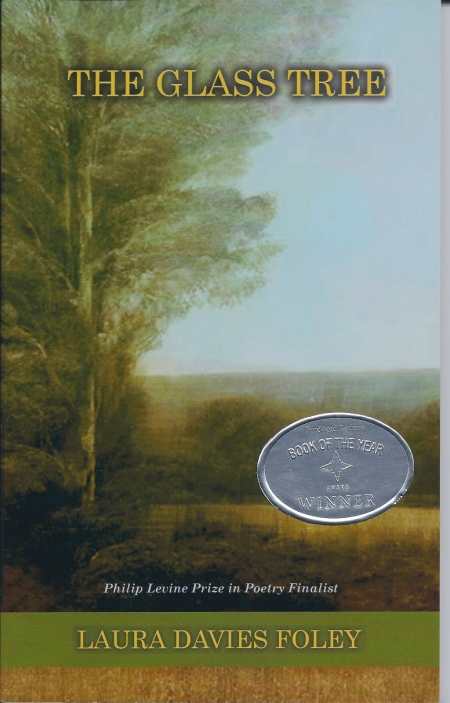
The Glass Tree
- 2012 INDIES Winner
- Silver, Poetry (Adult Nonfiction)
In her third poetry collection, The Glass Tree, Laura Davies Foley achieves a faultless marriage of the personal and universal. Foley shares her grief over her husband’s death, her pleasure in her children, and the personal rewards of her poetry work in descriptions that are short and spare. Most are no longer than a page. What the pieces don’t give up by being so restrained is a richness that comes from the poet’s keen observational eye.
In “Slow Loss,” Foley recounts her husband’s declining health: “his mind weakens first, / letting go of facts, numbers // vanishing in the brain’s haze … // Not for years does the body follow, / gleefully sprouting tumors, cancer.” The language is crisp and succinct, and the brief poem of three stanzas is like a sped-up time-lapse video of moving toward life’s end. Anyone can relate, either through experience or anticipation.
Foley excels at creating relatable snapshots of her unique situation. In the narrative poem “Autism,” she writes about her daughter, who wakes in the middle of the night wailing. Foley, half asleep, soothes her with the lovely suggestion to “Get the / dog … Put your fingers through her fur … Sail on her back.” After a second interruption, Foley dives back into sleep, “down to where lily fronds sway and children, if there are / any, are easy to love.” Foley’s description of a parent’s unconditional love is crystal clear.
Some poems address Foley’s work as a hospital chaplain giving comfort to patients and families. She beautifully describes the sick and dying as “undersea creatures” attached to breathing tubes and beeping, whirring machines. Her language paints complicated pictures with a seemingly paradoxical simplicity.
Perhaps the most intriguing poem is “Homelessness Retreat,” in which the poet spends three nights sleeping on the streets with strangers and with no money or change of clothes, and not even a toothbrush. At three pages, this is a longer piece than Foley’s others, and it powerfully describes homelessness with bravery and compassion—not romanticizing the situation, but honoring it.
The Glass Tree was a finalist for the Philip Levine Prize in Poetry. Foley’s previous books, both published in 2007, are Syringa and Mapping the Fourth Dimension. Her work has been published in several journals, and she has received multiple awards and fellowships, including the Atlanta Review International Poetry Contest Grand Prize.
Interestingly, Foley has also worked with prisoners on the art of meditation. In her poem “In Concord Prison,” a prisoner, Kevin, notices a bud on a tree in winter, something only he can see from his vantage point of a “narrow window / too small to crawl from.” This piece gives ownership to Kevin of something that cannot be taken away from him, as his freedom has been. It gives him dignity.
That is what Foley’s poems do. They take ownership of feelings—anguish, adoration, frustration, joy, serenity—and give dignity to the dying, the impaired, the homeless, the imprisoned. With this collection, Foley shows that poetry really does have the power to set us free.
Reviewed by
Olivia Boler
Disclosure: This article is not an endorsement, but a review. The publisher of this book provided free copies of the book and paid a small fee to have their book reviewed by a professional reviewer. Foreword Reviews and Clarion Reviews make no guarantee that the publisher will receive a positive review. Foreword Magazine, Inc. is disclosing this in accordance with the Federal Trade Commission’s 16 CFR, Part 255.
